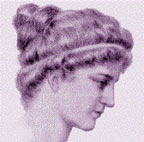
Hypatia, a woman “extraordinaire” born in Alexandria in 370 CE, taught
mathematics, geometry, astronomy and natural philosophy at the Great Library of
Alexandria, at a time when women were shunned from learning. She lectured on
people such as Diophantus, Plato and Aristotle and people came from all over the
world to hear her teach. In 400 CE she became the Director of the Library.
An inventor of a plane astrolabe and a way of measuring specific gravity, a
skilled orator and a daring visionary, she was indeed what today would be called
“a renaissance man”!
Hypatia was a self-assured, beautiful woman, soft on the outside but
steel-willed inside. She kept horses and drove her own chariot through the
streets of the city where she exerted considerable political influence.
“Hypatia belonged to the school of Greek thought whose beliefs were opposite of
the dominant Christian religion of the time.” In a political dispute between
Orestes, civil prefect of Egypt, and Cyril, the church patriarch, Hypatia sided
with Orestes. Cyril objected to her as a woman who did not know her place, and
her ideas about the right to think and promote experimental science.
Assassinated in 414 CE at the age of 45, Cyril's followers stripped the flesh
from her bones and burned her body parts. Later the collection of the library
was burned, depriving humankind of much of the rich knowledge of the ancients.
Civilization plummeted into a thousand years of Dark Ages. Many of Hypatia's
students went to Greece and Italy taking with them what they had been taught and
what later resurfaced to help fuel the “Renaissance”, the rebirth of learning
and Hypatia's honour.
International Women's Day